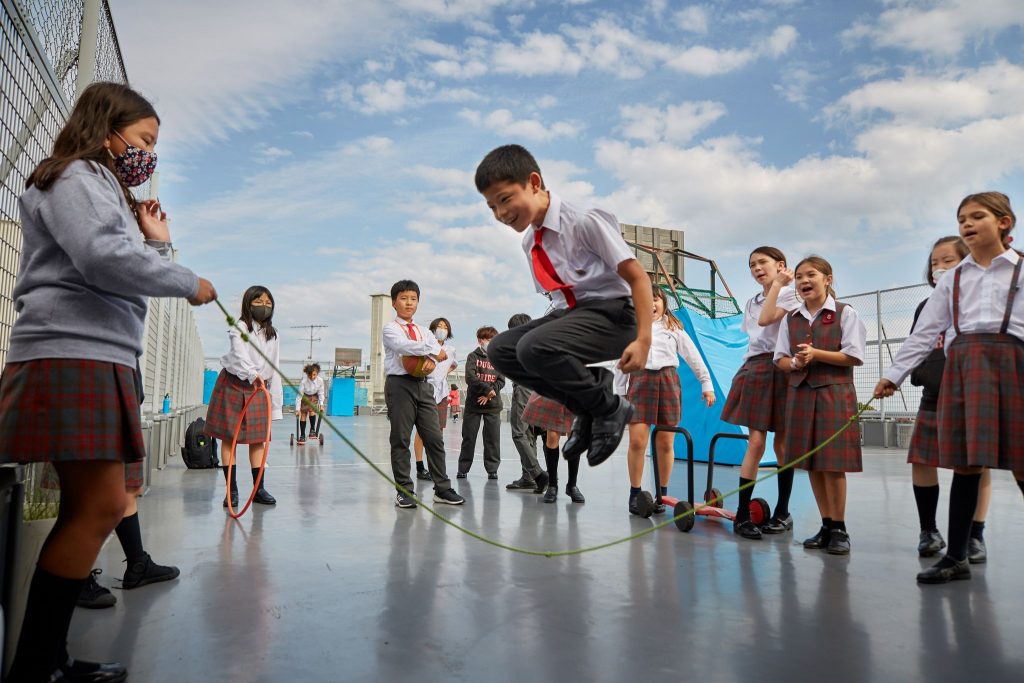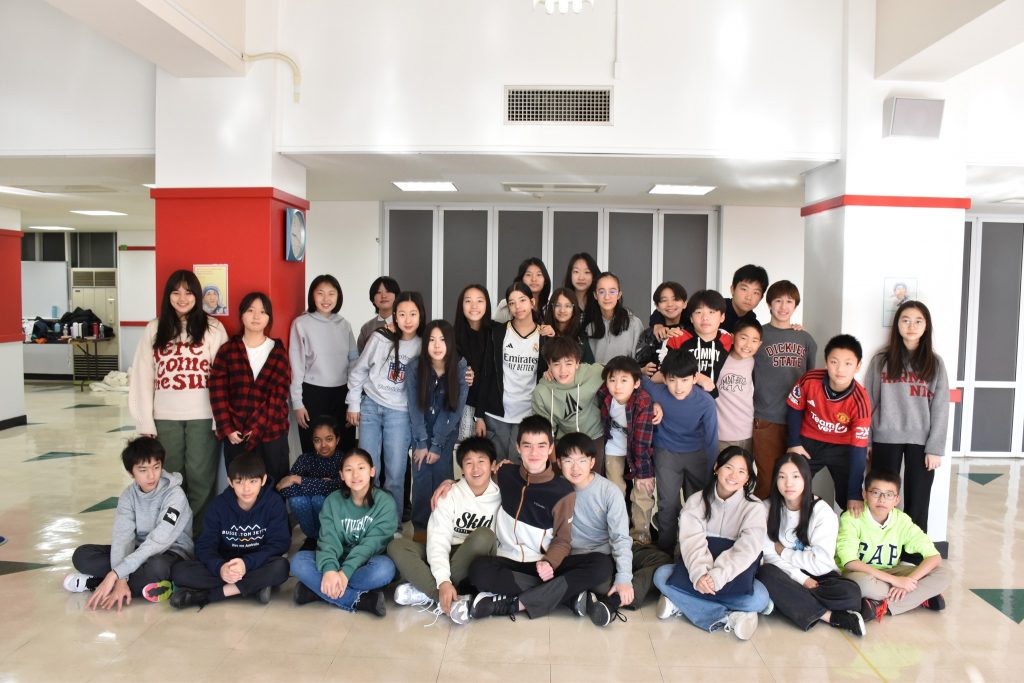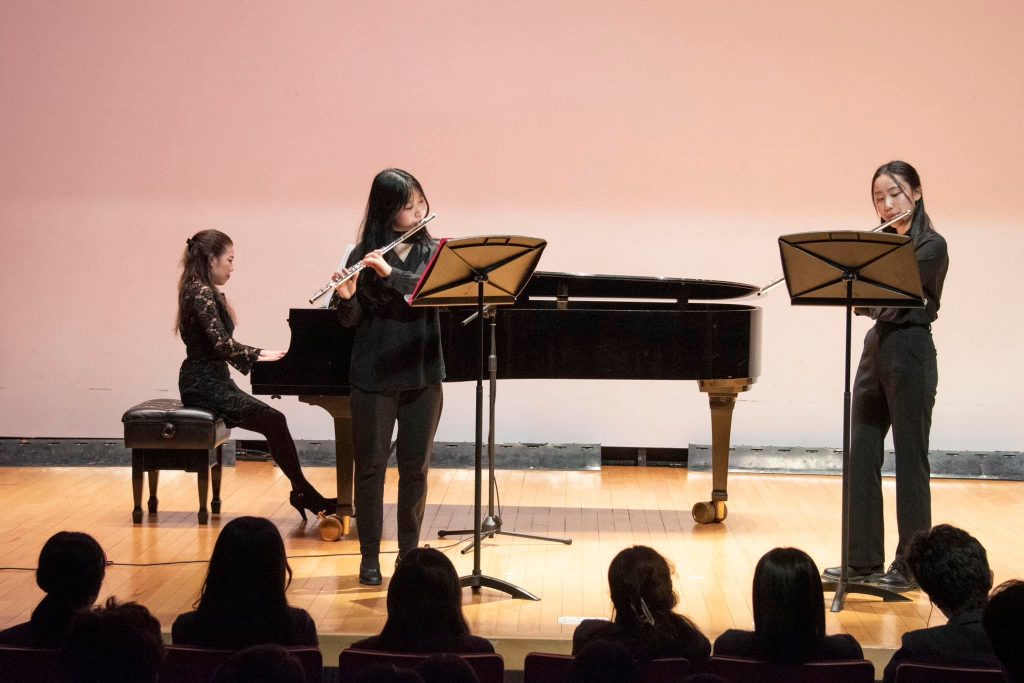Saint Maur International School Review

Saint Maur International School is a K-12 co-educational school located in Yokohama, Tokyo. Established in 1872, Saint Maur is the oldest international school in Asia and, while it educates based upon Catholic principles, the school is welcoming to children of all nationalities and faiths.
With a student to teacher ratio of 7:1 and around 450 students enrolled, Saint Maur is regarded as having been the pioneer of international education in Japan over its almost 150 year history. An associated Ecole Française, or “French School”, was opened in 2007 and is available to children from ages 5/6 to 10/11, to meet the needs of French and French-speaking families in the region. The ecole also provides programs for students in middle and high school who wish to continue learning French as their primary language.
Saint Maur follows aspects of the typical American school progression. However, students entering grade 9 prepare to take the IGCSE exams in Grade 10 and go on to the IB Diploma Program for Grades 11 and 12. Additionally, there are options for students to take Advanced Placement classes and the SAT standardised test.

Admissions
Despite being a Catholic school, and offering an education based upon Christian principles, Saint Maur is a welcoming environment for all religions, nationalities, ethnicities and ethnicities. The school does not discriminate in its employment or student selection practices based on race, religious beliefs, national and ethnic origin, sexual orientation, or physical disability, although it must be noted that the campus is not ‘barrier-free’ and students who may struggle with the physical demands of campus should speak with school administrators.
Applications are accepted from Japanese students who are applying from abroad and are classified as being members of the international community as they are either
- ‘Recent returnees’
- Transfer students from other full-time English-medium international schools within Japan
- Students for whom due to family background, attending a Japanese/ethnic local school within Japan would not be beneficial.
In the case of Japanese dual nationals, they are eligible to apply if one parent or legal guardian is a proficient speaker and reader of English and is able to communicate in written English to engage meaningfully with the school and support the student in their learning language.
Admissions Process
The admissions process for Saint Maur’s is as follows:
- Inquiry: The submission of an online pre-application Inquiry Form (no charge involved) is required to determine eligibility to apply to Saint Maur International School. The submission of an inquiry provides essential information, allows the correct personnel to be assigned to the file, and allows necessary clarifying questions to be asked. After an inquiry is submitted, a family may visit the school if they are eligible for admission.
- Application: If the family is eligible to apply, they will be sent an admissions link. The application requires various information to be submitted, including a copy(ies) of passport(s) and two years of academic records in English (with the exception of the French school). We will also require parents to provide contact details for two Confidential Teacher’s Recommendations. For Preschool students, it is recognized that such documentation may not be available or will be limited. Where a student has particular learning needs or differences, professional assessments, and related documentation will be requested. Particularly for secondary students, additional information may be requested, including standardized testing results and in high school, IGCSE, or IB related preparatory documentation. An application fee is collected, paid by credit card, in this portion of the application process.
- Evaluations
- 4th-11th Grades: All incoming students from Grade 4 through 11 are evaluated prior to acceptance. Saint Maur does not usually accept 12th grade students due to the demands of the IB Program that commences in 11th grade. Evaluations are conducted in a developmentally appropriate manner and cover English language skills and Mathematics. For students that are not in Japan or for students who cannot travel to campus, the evaluation will be administered remotely.
- 1st-3rd Grades: All incoming students from Grade 1 through 3 are also evaluated prior to acceptance. However, for such young students, it is not developmentally appropriate for them to be subject to a remote evaluation. Therefore, for students that are not in Japan or for students who cannot travel to campus, a “tentative” acceptance will be issued and the actual evaluation will be administered upon arrival prior to the student starting their classes.
- Acceptance: A full acceptance or “probationary/conditional” acceptance may be issued to allow a family to enroll the student. A “probationary/conditional” acceptance is issued when there are special student-specific requirements necessary for a student to be successful.
- In the case of full enrollment: If an opening for the student is not available at the time it is determined that a student is admissible, that student will be placed in the Waiting Pool. The waiting pool is not sequentially structured and Saint Maur will accept first the student that is the best match for the school.
Admissions Standards
Montessori Pre-school: Children who are toilet trained, and do not require the use of ‘pull-ups’ or any form of diaper/nappies, and are 2 ½ – 5 years old are eligible to apply for entry into Saint Maur’s Montessori Pre-school. 2 ½ – 3 year olds are eligible for a half-day, or an extended day program. From the age of 4, students are expected to attend on a full-time basis to join the afternoon pre-literacy program. As no evaluation is given, acceptance into the program is based upon the understanding that the child is ready for formal schooling, and is able to use the bathroom independently and able to integrate within the classroom environment.
Acceptance into the Montessori Pre-school program does not make a student automatically eligible to transit into the elementary section of Saint Maur’s. All applicants seeking entry into the elementary school are required to
- have attained an age-appropriate level of maturity;
- follow group direction, and implement such directions with the minimum amount of teacher assistance;
- can complete age-appropriate tasks within a prescribed time frame;
- have acquired age-appropriate social and behavioral skills;
- have acquired an age-appropriate level of language skills.
Elementary through Secondary School: Students who apply for entry into the Elementary through Secondary School sections are required to demonstrate that they have the potential ability to meet the demands of our academic/social program, and would benefit from the education Saint Maur International School has to offer. English Proficiency is desired, but not required for Grades 1 through 8. English as an additional language (EAL) support and classroom differentiation and support will be supplied as necessary to strengthen a student’s academic language ability.
Secondary School Entry: Students of all English language abilities are considered for admission from Grade 6 through Grade 9. From Grade 10 and above, academic English proficiency and skills are assumed, required and essential for success due to the increased rigor of the academic program.
Incoming 9th and 10th-Grade students will join the two year IGCSE program. Incoming grade 11 students will join the IB Curriculum and will participate in the IB program as either a Full Diploma Program Candidate or a Course Candidate. For students who register as Course Candidates, they are offered the option of registering for Creativity, Activity, Service (CAS), and the Extended Essay (EE). All students are registered for the Theory of Knowledge (ToK) class.

Education
Education at Saint Maur’s is divided between a preschool and kindergarten teaching the Montessori system, an elementary school, a middle school, a high school and an Ecole Française, or “French School”.
Saint Maur’s preschool and kindergarten was the first of its kind to bring the Montessori system of education to Japan. The Montessori method is a specific child-centered method of education that creates classrooms of students at varying ages and encourages them to choose what they want to learn. You can learn more about the pros of cons of a Montessori education here. At Saint Maur’s, Montessori classrooms include children aged between 2 ½ – 5+, and children may work individually or in small groups. Classrooms are designed to cultivate student’s natural curiosity, especially through working with their hands, and through the duration of the program students are introduced to mathematics, language phonetics, social studies, science, music and art.
The Elementary School curricular program combines elements of the International Primary Curriculum (IPC) and the Common Core to include Language Arts, Structured Word Inquiry, Mathematics, Science, Social Studies, Japanese, English as an Additional Language, Religious Studies, PSHE (Personal, Social, & Health Education), Technology, Art, General, Vocal & Instrumental Music, Grade 5 Band, Physical Education, Maker Space, and Library Skills. In Elementary School students spend the majority of their day with their homeroom teacher, but take certain subjects with regularly scheduled specialist teachers.
English as an Additional Language (EAL) in the elementary international section provides support for students who have been identified as beginning language learners, with the aim of assisting students in accessing the curriculum and helping them to cope with the language demands of their respective grade. Furthermore, in Elementary School, each grade takes part in some exciting field trips throughout the year. Recent trips include visits to Apple, the Mitsubishi Museum, Morinaga Chocolate Factory, & the Ueno Science Museum.
Middle School students follow an established curriculum of English, Natural Science, Mathematics, Social Studies (Geography in Grade 6 & 7 and World History in Grade 8), Technology (Computer Applications, Computer Science & Robotics), Fine Arts (Studio Art, Music, and Drama), World Language (Japanese + French or Spanish), Religious Studies, Physical Education and Personal, Social and Health Education (PSHE). Students in Grades 6 & 7 also take an Organizational Skills class. An elective course among Computer Science, Studio Art, and Drama is selected in Grade 7 to study in Grade 8. At the end of Grade 8, two elective option courses are selected for continued study in Grade 9. The first course is among IGCSE Computer Science, IGCSE Visual Arts, IGCSE Drama and IGCSE Music. The second course is the World Language course among either Japanese, IGCSE French B or IGCSE Spanish B.
Middle School students meet on a daily basis with their homeroom teachers for morning prayer and any announcements for the day. Each homeroom has two assigned teachers to care for students and monitor their overall school experience. In addition to the pastoral support students receive through their Homeroom experience, in Grades 6 and 7, students are assigned a Middle School staff member as their advocate, whom they meet with once each cycle. This advocate program is designed to provide students with adult role models and is guided by the students’ needs and interests. Twice a year, all Middle School students participate in educational excursions that extend the curriculum beyond school and offer experiences that connect and relate to their classroom curriculum. At each Middle School Grade Level, students also participate in an extended educational excursion that usually last 2 nights and 3 days.
Students in Grades 9 and 10 take courses that prepare them for the exams in many of the subjects provided by the International General Certificate of Secondary Education (IGCSE). The IGCSE is operated by the University of Cambridge and, while particularly applicable to the UK system, IGCSEs are the most widespread international curriculum for Grades 9 and 10 in the world.
In Grade 11, all students enter the International Baccalaureate (IB) program. As all courses offered are IB courses (with one exception), all students are considered IB Course Candidates. Students who have the appropriate academic qualifications to fulfill the requirements of the full IB Diploma program have the choice to register for it. Students can choose six subjects from the 22 offered at Saint Maur and study them in small classes with personal teacher attention. After completing IB exams, students can use their scores for advanced placement and college credit in university.
Students are eligible to take Advanced Placement (AP®) exams in some of the same subjects they are studying as part of the IB program. This enables students to gain maximum advantage in university admission and college credit.
Each Saint Maur High School student is a member of a homeroom which they attend daily, with between 24 and 40 classmates and two homeroom teachers and one or two advisory teachers. While regular classes are smaller, homeroom allows students to interact socially with their peers. The homeroom is designed to be a social center while at school, where each student has an individual desk and storage space.
All Saint Maur students go on excursions, culminating in a three-day pre-graduation trip within Japan for grade 12 students. These excursions are educational, and are usually directly linked to topics being studied in the classroom. However, they are also excellent opportunities for students to build lasting friendships and memories together.

Leadership, Extracurriculars and Sports
A wide range of extracurricular/club activities are offered at the Elementary School as a means of producing well-rounded students. Clubs offered focus on athletic activities, dance, drama, Lego, crafts, arts, cooking, woodworking, robotics, and martial arts, to name a few. The costs of participating in the majority of activities are covered within the school fee structure; however, some activities/clubs are offered at additional costs to cover transportation, equipment, materials, etc. Elementary Clubs are offered on Monday, Tuesday (sports emphasis), Thursday and Friday afternoons from 3:30 to 4:30 pm.
In Middle School, Saint Maur organizes its practice and performance schedules so that each student can choose to participate in Fine Arts and Sports, in addition to various other clubs.
Sports available for Middle School students include soccer, basketball, cross-country, boys baseball and girls volleyball. The sports are divided into 3 seasons of approximately 3 months per season. Fine Arts is explored both through academic study and through extensive extracurricular activities. Ping Pong, Speech, Brain Bowl, Dance, World Scholars Cup, Math Challenge and Student Council are among popular extra-curricular activities that complement a wide variety of after school clubs such as Robotics, Irish Dance, Tennis, Drama, Visual Arts, Film, First Aid & CPR, Yearbook and Japanese Animation Studies. Whether involved in Sports, Fine Arts, or other Club activities, Middle School students are able to compete and collaborate with other international schools in the Kanto Plain Association of Middle Schools – our regional league and beyond.
Middle School students also participate in various opportunities to raise awareness of local or global issues or serve the local community. Recently, the Middle School Student Council hosted a fundraising event for the World Wildlife Fund on campus.
A comprehensive Summer School at Saint Maur’s is currently postponed due to construction on the campus. However, at the conclusion of the construction which is forecast for April 2021, the Saint Maur Summer Program will restart. Courses offered during the Summer Program have included Creative Writing, Enhance Your Brain Power, Japanese, Digital Media, Journalism/Global Issues, Mathematics, Basketball Clinic, Radio & TV Production and IGCSE English.

Outcomes
At IGCSE (International General Certificate of Secondary Education) level, Saint Maur students perform very well, with 40.5% of grades being A to A* and 85.6% of grades being C to A* (where a C is considered a “higher level” pass) in the most recent examinations cycle.
Turning to the IB Diploma program, in the most recent graduating class, 23 of the 24 Grade 12 Full Diploma candidates successfully completed the requirements to earn the IB Diploma with an average score of 33 points out of 45. The average subject grade obtained by candidates who passed the diploma was 5.21 (out of 7), while the average subject grade obtained by students who did not pass the Full Diploma was 3.87 (out of 7). Of all courses examined, Saint Maur’s overall student average grades exceeded the world-wide average in 20 courses. 33% of Diploma Candidates earned 35 or more points while 8% scored 40 points or more. The Bilingual Diploma recognizes those Diploma Candidates who studied a second Group 1 Language course. 33% of Saint Maur students achieved the Bilingual Diploma this past year.
A select number of students at Saint Maur also take AP® classes in addition to the school’s regular IB curriculum, seeking the college credit and advanced standing in college classes that high AP® scores can provide. The most recent graduating class took 38 AP® exams in total, with 79% at the 4+ score necessary to attain college credit and 26% achieving the maximum score of 5. The average AP® score for Saint Maur students last year was 3.6, compared to a world average of 2.9. Saint Maur students are often the recipients of impressive AP® awards, including the International AP® Scholar award, which recognises the one male and one female student attending a school outside the United States and Canada that is not a DoDEA school with the highest average score on the greatest number of AP® Exams.
The information in this report comes from the experiences of Saint Maur students, the expertise of Tokyo Academics educators who work with students from Saint Maur on a regular basis, The Good Schools Guide International and the Saint Maur International School webpage.
AP® is a trademark owned by the College Board, which is not affiliated with, and does not endorse Tokyo Academics.
Looking for More International School Guidance?
Visit our Resource Center and gain access to recorded webinars, podcast episodes, school profiles, and more.
Academic Services
Admissions
Additional Services
Community
Contact
Call us
Email us
Visit us
Tokyo Academics
Nishiazabu 3-24-17,
Hirose Building 3F,
(above FamilyMart)
Minato, Tokyo 106-0031
Tokyo Academics
Futako Tamagawa
Tamagawa 1-9-3
LIBERLA Futako B1F
158-0094
Tokyo Academics
© Copyright 2025 Tokyo Academics | All Rights Reserved | Terms of Use | Privacy Policy
Contact
Call us
Email us
Visit us
Tokyo Academics
Nishiazabu 3-24-17,
Hirose Building 3F,
(above FamilyMart)
Minato, Tokyo 106-0031
Tokyo Academics
Futako Tamagawa
Tamagawa 1-9-3
LIBERLA Futako B1F
158-0094
Tokyo Academics
